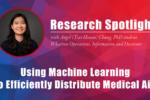
University of Penn students partnered with RxSense for the Spring 2025 AI & Analytics Accelerator. The group worked to to develop a forecasting model to predict drug utilization trends for 2025, enabling RxSense’s clients—pharmacy benefit managers (PBMs) and health plans—to more effectively budget for and manage pharmacy costs. …Read More










